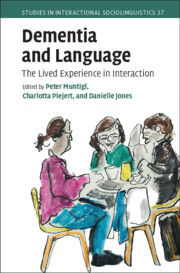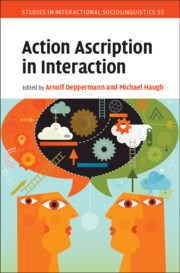Dementia and Language
Bringing together cutting-edge research from a group of international scholars, this innovative volume examines how people with dementia interact with others in a variety of social contexts, ranging from everyday conversation to clinical settings. Drawing on methods from conversation analysis, it sheds light on how people with dementia accomplish relevant goals in interaction, as well as how changes in an individual's discursive abilities may affect how conversationalists negotiate a world in common and continue to build their social relationships. By exploring interaction, this book breaks new ground in challenging the commonplace assumptions about what constitutes typical or atypical interactions in communication involving people with dementia, and further demonstrates the unique and creative strategies all speakers employ to facilitate better and more collaborative communication. It is essential reading for academic researchers and advanced students across sociolinguistics, interactional linguistics and conversational analysis, as well as health care practitioners.
- Provides examples of conversations involving persons with dementia in real life situations
- Shows how persons with dementia navigate varying situational contexts, ranging from everyday interactions to medical-diagnostic consultations
- Highlights conversational strategies used when speaking with persons with dementia
Reviews & endorsements
'As more and more people learn to live with dementia, there is an increasing need to identify and build on their communication and social skills rather than merely to describe what they cannot do or the errors they make. This book, examining conversations involving people with dementia in a broad range of clinical and everyday scenarios, should not only be of great interests to scholars of language, communication and social interaction but also to the many different health and care professionals who try to connect with the identity and views of the individuals with dementia they work with.' Markus Reuber, Professor of Clinical Neurology, University of Sheffield
'Muntigl, Jones, and Plejert, with their all-star cast of authors, draw on the rigorous methods of Conversation Analysis (CA) to offer readers an illuminating journey through a fascinating range of understudied clinical and everyday interactions involving persons living with dementia. Their thoughtful and critical engagement with the binary notions “normal versus abnormal, typical versus atypical, competency versus incompetency, deficit versus ability” will energize all who seek to understand the particularities and complexities of lived experiences at the intersection of language and dementia.' Heidi E. Hamilton, Professor Emerita of Linguistics, Georgetown University
'This book is one that is relevant to researchers, clinicians, and even families, for it explores a host of themes that are relevant to all: diagnosis, interaction, everyday life, and domains of knowledge and control. It is not a book that only addresses decline and deficit; it also highlights adaptation and adjustment on the part of those with the syndrome and those with whom they are in relationships. Read this book, learn, and be richly rewarded!' Douglas W. Maynard, Hallinan Professor Emeritus of Sociology and Garfinkel Faculty Fellow Emeritus, University of Wisconsin—Madison
Product details
November 2024Hardback
9781108424530
378 pages
235 × 159 × 25 mm
0.68kg
Not yet published - available from February 2025
Table of Contents
- Part I. Introduction:
- 1. Interaction research and dementia Peter Muntigl, Danielle Jones and Charlotta Plejert
- Part II. Dementia and Diagnostics:
- 2. Good reasons for non-standardisation in the administration of cognitive assessments Danielle Jones, Clare Jackson and Ray Wilkinson
- 3. (Dis)alignment at dementia diagnosis: a window into differing expectations, perceptions and agendas in the memory clinic Jemima Dooley and Rose Mccabe
- 4. The role of applied conversation analysis to enhance equity in care for people with dementia from minority ethnic groups Charlotta Plejert
- Part III. Dementia and Conversational Strategies:
- 5. Using 'now what' to discursively compensate for frontotemporal dementia-related challenges: a longitudinal case study Lisa Mikesell
- 6. Being sociable: a case study of a man with vascular dementia singing in conversation Roy Foster
- 7. On the use of tag questions by co-participants of people with dementia: asymmetries of knowledge, power and interactional competence Jacqueline Kindell, John Keady and Ray Wilkinson
- 8. Initiating and pursuing a topical agenda with limited communicative resources Anne Marie Dalby Landmark and Jan Svennevig
- Part IV. Dementia and Epistemics:
- 9. Identifying family members in photographs: practical epistemic and deontic challenges for a person with frontotemporal dementia Peter Muntigl, Gerhard Ransmayr and Stephanie Hödl
- 10. 'You know this better': interactional challenges for couples living with dementia when the epistemic status regarding shared past events are uncertain Anna Ekström, Elin Nilsson and Ali Reza Majlesi
- 11. Maintaining personhood and authority in everyday talk of a family living with dementia Lindsay Lindley
- Part V. Communicative Challenges in Everyday Social Life:
- 12. Language and cognition in conversations with a person with Alzheimer's disease Danielle Jones
- 13. Using digital communication support in interaction involving people with dementia– interactional strategies to facilitate participation and engagement Christina Samuelsson
- 14. 'It's more than eating, it's a social situation' – video analysis and professional vision in dementia care Camilla Lindholm and Tuula Tykkyläinen
- 15. Social quizzes for people living with dementia: how enactment impacts on interaction Joe Webb.







